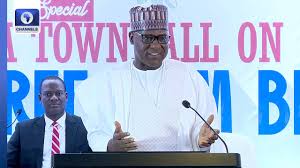501
By Tracy Moses
Former Speaker of the House of Representatives, Rt. Hon. Yakubu Dogara, has praised President Bola Ahmed Tinubu’s tax overhaul as the most daring restructuring of Nigeria’s fiscal system in recent decades. He, however, warned that the initiative can only succeed if backed by transparency and consistency to bridge the country’s lingering trust deficit.
Dogara gave the remarks on Tuesday at the National Assembly Complex, Abuja, while delivering the maiden Distinguished Parliamentarian Lecture organised by the House of Representatives Press Corps.
The lecture, themed “Navigating Tax Reform in Nigeria: Insights on President Tinubu’s Policies,” explored the background, scope, and potential implications of the reforms contained in the Nigeria Tax Act (NTA) 2025 and related laws.
According to him, President Tinubu assumed office amid a weakened economy weighed down by what he called “economic wreckage”—ranging from reckless deficit financing through Ways and Means, a dual exchange rate system that enriched a select few, to crude oil forward sales tied to external debt.
“By the time President Tinubu assumed office, ₦22.7 trillion had been printed and pumped into the economy, wrecking the value of the naira. Some chosen individuals were making hundreds of millions from forex allocations without adding any value,” Dogara said, stressing that urgent corrective measures became inevitable.
He explained that the reforms harmonise 16 federal tax statutes into four major laws: the Nigeria Tax Act (NTA) 2025, Nigeria Tax Administration Act (NTAA) 2025, Nigeria Revenue Service (Establishment) Act (NRSEA) 2025, and the Joint Revenue Board (Establishment) Act (JRBEA) 2025. Together, they aim to unify existing frameworks, extend taxation to digital services and crypto assets, strengthen revenue administration, and simplify compliance.
Scheduled for full implementation by January 2026, the reforms are designed to expand the tax net, simplify Nigeria’s complex fiscal regime, and align it with global standards. Quoting the report of the Presidential Committee on Fiscal Policy and Tax Reforms led by Prof. Taiwo Oyedele, Dogara said the package was deliberately crafted to shield the poor, support businesses, and promote fairness across board.
He noted that the relief measures include exemptions for small businesses with turnover of ₦100 million or less, rent reliefs for salaried workers, credits for upstream oil producers, and income tax waivers for individuals earning ₦800,000 or less annually. On the contentious 5% fuel surcharge, Dogara clarified that it was not a fresh levy but a retained clause from the Federal Roads Maintenance Agency (FERMA) Act of 2007. He stressed that it exempts household fuels like kerosene, LPG, and CNG, and would only be activated following a gazette by the Finance Minister.
Despite his commendation, Dogara pointed out looming challenges such as manpower shortages, compliance costs, interpretational uncertainties, and the push towards digitalisation. “The transition to e-invoicing and automated filing will improve efficiency but requires extensive digital infrastructure and stronger cybersecurity capacity,” he warned, urging businesses to invest in technology and staff training.
He emphasised that the success of the reforms rests on building public confidence: “Tax reform is not about raising rates, but raising trust. When citizens see where their money goes, they are more willing to contribute.” He urged the government to visibly apply tax revenues to infrastructure, industries, schools, and hospitals, adding that sustained implementation could cement Tinubu’s place as “the most consequential economic reformer in Nigeria’s history.”
The lecture also attracted support from various stakeholders. Speaker of the House of Representatives, Rt. Hon. Tajudeen Abbas, represented by House Spokesperson Hon. Akin Rotimi Jnr., described the reforms as one of the most significant interventions of the Fourth Republic. The Federal Inland Revenue Service (FIRS), represented by Mr. Olufemi Olarinde on behalf of Chairman Dr. Zacch Adedeji, reiterated its support for press freedom and encouraged journalists to master the reforms for balanced reporting.
Executive Director of the Civil Society Legislative Advocacy Centre (CISLAC), Auwal Musa Rafsanjani, also endorsed the reforms, urging fairness, accountability, and gender-sensitive application. Hon. Jafaru Leko said the initiative strikes a balance between revenue generation and equity, while NUJ FCT Chairperson, Comrade Grace Ike, stressed that reforms must translate into visible improvements in infrastructure and living standards, with the media playing a crucial role in fostering trust.
Chairman of the House of Representatives Press Corps, Gboyega Onadiran, and Organising Committee Chairman Philip Nyiam explained that the Distinguished Parliamentarian Lecture was conceived to narrow the gap between parliament and the public, simplify complex issues, and encourage accountability. Both commended Dogara’s statesmanlike contributions, noting that his insights enriched the national conversation on governance and fiscal reform.



